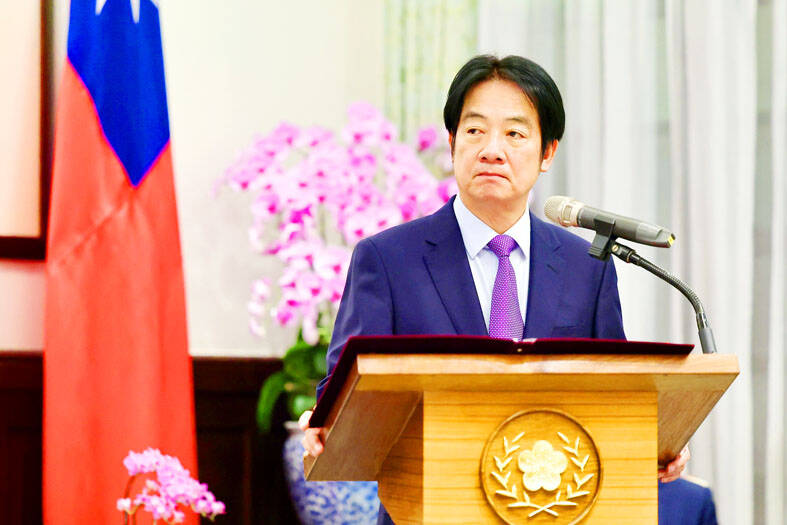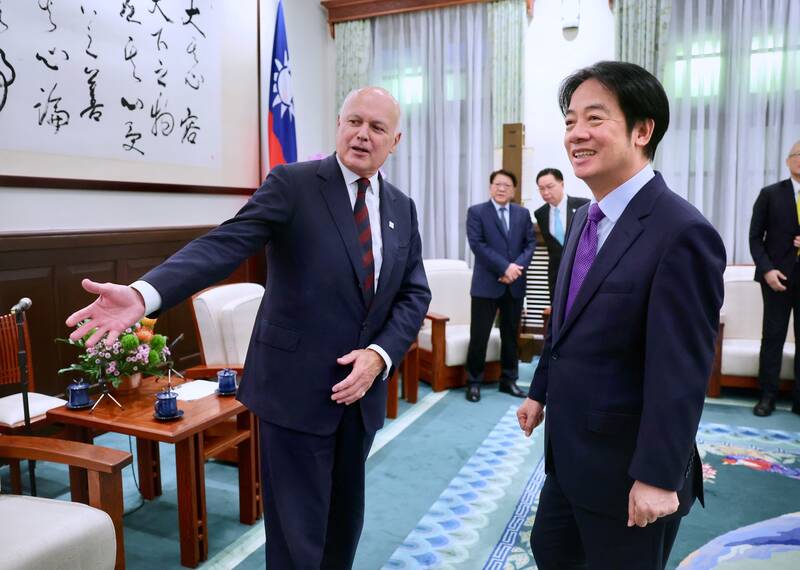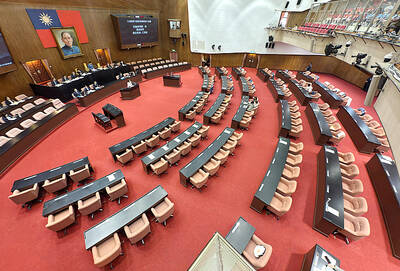President William Lai (賴清德) yesterday emphasized his administration’s commitment to strengthening Taiwan’s military capabilities and security cooperation with allies, reiterating the nation’s target to increase defense spending to 5 percent of GDP by 2030.
Lai made the comments in a meeting with a group of international lawmakers from the Inter-Parliamentary Alliance on China (IPAC) at the Presidential Office in Taipei.
The delegation included former British Conservative Party leader Iain Duncan Smith, former Polish minister of foreign affairs Anna Fotyga, Swedish lawmaker Magnus Berntsson, and IPAC cofounder and executive director Luke de Pulford.

Photo: CNA
Presidential Office Secretary-General Pan Men-an (潘孟安), National Security Council Secretary-General Joseph Wu (吳釗燮) and Deputy Minister of Foreign Affairs Francois Wu (吳志中) also attended the event.
Lai told the delegation that China’s relentless campaign of intimidation and saber rattling against its neighbors and other nations significantly threatens regional peace and stability, while its alliance with authoritarian powers, including Russia, threatened democracies across the world.
Democratic nations have no choice but to combine their deterrence capabilities to defend peace, freedom and democracy, he said.

Photo: CNA
The government is raising next fiscal year’s military budget to 3.32 percent of GDP with the aim of reaching 5 percent over the next five years, in line with NATO’s defense spending goal, he said.
The nation would bolster its self-defense capabilities to contribute to peace and stability in the region, and forge hardened supply chains aimed at creating a resilient economy in collaboration with its democratic partners, he said.
Taiwan’s economic outreach is focused on forging mutually beneficial ties in the energy, artificial intelligence and technology sectors with its partners, Lai said, adding that cooperation would bring prosperity and reinforce democracy at home.
The IPAC showed its support for Taiwan in July last year, sending a delegation and issuing a statement disputing Beijing’s interpretation of UN Resolution 2758, he said.
The alliance’s actions led to a wave of pro-Taiwan resolutions in the EU, the Netherlands, the Czech Republic and the UK, he said, adding that he hoped more nations would come forward to support Taiwan.
The IPAC has expressed its concern over China’s drills that encircled Taiwan in April, and condemned Chinese intelligence agents’ plot to crash a car into Vice President Hsiao Bi-khim’s (蕭美琴) vehicle during her visit to the Czech Republic in March last year, he said.
It also facilitated former president Tsai Ing-wen’s (蔡英文) participation in this year’s Copenhagen Democracy Summit, Lai said.
Duncan Smith urged democracies to stand with Taiwan against growing threats from China, saying that Beijing’s authoritarian regime “plots and plans the demise of Taiwan.”
Too “many Western governments in the pursuit of trade now seem prepared to turn a blind eye to the brutal behavior of China,” he said, calling it “a modern form of appeasement.”
On Tuesday, Hsiao said that China’s bullying would not intimidate Taiwan in abandoning democracy or shake the commitment of Taiwanese to defend their hard-won freedoms.
She made the comments at a banquet hosted by the IPAC and nonprofit organization Hello Taiwan in Taipei, after thanking the alliance for its unequivocal support of Taiwan in confronting the authoritarian challenge posed by Beijing.
Taiwan’s free and democratic form of government, which was achieved at a great cost to Taiwanese, has been crucial to its ability to garner international goodwill and support from organizations such as IPAC, she said.
Taiwanese will not bow to China’s bullying, intimidation or coercion, Hsiao said.
“We are proud to call ourselves Taiwanese, proud of all that the nation has achieved, and proud of our faith in what Taiwan will achieve, no matter how hard it is to be Taiwanese,” she said.
Taiwan continues to work with like-minded friends and partners in its struggle to preserve democracy, Hsiao said.
Additional reporting by Huang Ching-hsuang

CROSS-STRAIT COLLABORATION: The new KMT chairwoman expressed interest in meeting the Chinese president from the start, but she’ll have to pay to get in Beijing allegedly agreed to let Chinese Nationalist Party (KMT) Chairwoman Cheng Li-wun (鄭麗文) meet with Chinese President Xi Jinping (習近平) around the Lunar New Year holiday next year on three conditions, including that the KMT block Taiwan’s arms purchases, a source said yesterday. Cheng has expressed interest in meeting Xi since she won the KMT’s chairmanship election in October. A source, speaking on condition of anonymity, said a consensus on a meeting was allegedly reached after two KMT vice chairmen visited China’s Taiwan Affairs Office Director Song Tao (宋濤) in China last month. Beijing allegedly gave the KMT three conditions it had to

‘BALANCE OF POWER’: Hegseth said that the US did not want to ‘strangle’ China, but to ensure that none of Washington’s allies would be vulnerable to military aggression Washington has no intention of changing the “status quo” in the Taiwan Strait, US Secretary of Defense Pete Hegseth said on Saturday, adding that one of the US military’s main priorities is to deter China “through strength, not through confrontation.” Speaking at the annual Reagan National Defense Forum in Simi Valley, California, Hegseth outlined the US Department of Defense’s priorities under US President Donald Trump. “First, defending the US homeland and our hemisphere. Second, deterring China through strength, not confrontation. Third, increased burden sharing for us, allies and partners. And fourth, supercharging the US defense industrial base,” he said. US-China relations under

The Chien Feng IV (勁蜂, Mighty Hornet) loitering munition is on track to enter flight tests next month in connection with potential adoption by Taiwanese and US armed forces, a government source said yesterday. The kamikaze drone, which boasts a range of 1,000km, debuted at the Taipei Aerospace and Defense Technology Exhibition in September, the official said on condition of anonymity. The Chungshan Institute of Science and Technology and US-based Kratos Defense jointly developed the platform by leveraging the engine and airframe of the latter’s MQM-178 Firejet target drone, they said. The uncrewed aerial vehicle is designed to utilize an artificial intelligence computer

The Chinese Nationalist Party (KMT) caucus yesterday decided to shelve proposed legislation that would give elected officials full control over their stipends, saying it would wait for a consensus to be reached before acting. KMT Legislator Chen Yu-jen (陳玉珍) last week proposed amendments to the Organic Act of the Legislative Yuan (立法院組織法) and the Regulations on Allowances for Elected Representatives and Subsidies for Village Chiefs (地方民意代表費用支給及村里長事務補助費補助條例), which would give legislators and councilors the freedom to use their allowances without providing invoices for reimbursement. The proposal immediately drew criticism, amid reports that several legislators face possible charges of embezzling fees intended to pay